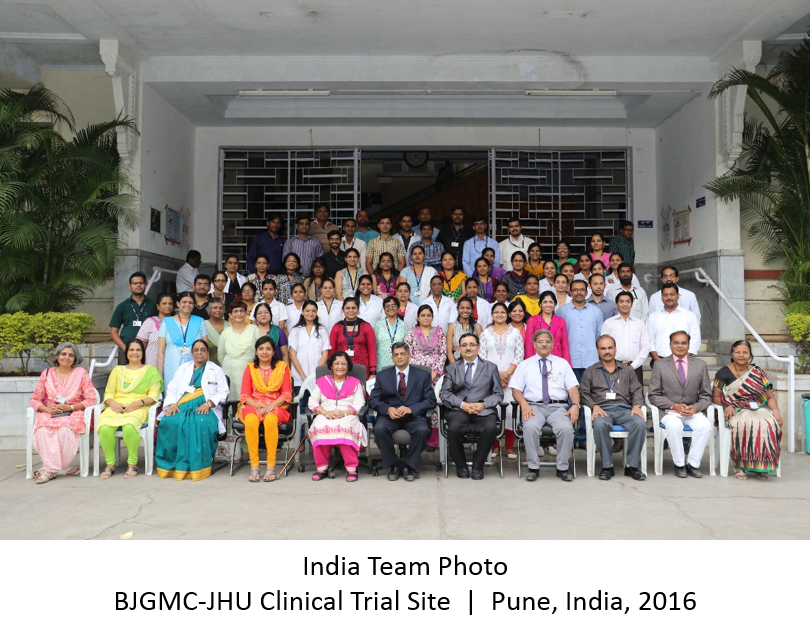BJGMC Clinical Research Team Exceeds 6,000 Participant Enrollments in 4 Years
 The Indo-JHU Clinical Research partnership at Byramjee Jeejeebhoy Government Medical College (BJGMC) in Pune, India, is on an enrollment roll. The team has enrolled more than 6,000 participants in clinical trials and epidemiological studies, with approximately 1,200 during the last year. Indo-JHU research is led by Dr. Vidya Mave, Dr. Nishi Suryavanshi, and Dr. Nikhil Gupte in collaboration with BJGMC Deans Ajay Chandanwale and Sameer Joshi, and several heads of department, including Drs. Sangle of Medicine, Bhosale of Obstetrics and Gynecology, Bharadwaj of Microbiology, Kinikar of Pediatrics, and Gaikwad of Chest Medicine.
The Indo-JHU Clinical Research partnership at Byramjee Jeejeebhoy Government Medical College (BJGMC) in Pune, India, is on an enrollment roll. The team has enrolled more than 6,000 participants in clinical trials and epidemiological studies, with approximately 1,200 during the last year. Indo-JHU research is led by Dr. Vidya Mave, Dr. Nishi Suryavanshi, and Dr. Nikhil Gupte in collaboration with BJGMC Deans Ajay Chandanwale and Sameer Joshi, and several heads of department, including Drs. Sangle of Medicine, Bhosale of Obstetrics and Gynecology, Bharadwaj of Microbiology, Kinikar of Pediatrics, and Gaikwad of Chest Medicine.
According to BJGMC Clinical Research Site (CRS) Director Dr. Vidya Mave, “The growth in the numbers of studies and participants has presented challenges that the team has really risen to. Among contributions of more than dedicated 150 team members, we owe much of our participant recruitment and management success to effective community outreach led by Savita Kanade and truly impressive coordination of studies by Dr. Nishi Suryavanshi. The CRS team is making a difference, and we take pride in our site’s contributions.”
As a member of the AIDS Clinical Trials Group (ACTG)—an NIH-sponsored international HIV/AIDS research network—the team enrolled 261 participants in interventional trials, making BJGMC CRS one of the top enrollers among all ACTG sites internationally. Dr. Amita Gupta of John Hopkins University School of Medicine leads the Indo-JHU clinical research partnership, “The past year has been a record year and a huge amount of work that the dedicated members of the Pune team have accomplished with the ACTG network. It’s personally motivating and inspiring for all of us to witness this decades-long research partnership reach the top of the rolls of AIDS research internationally.”
ACTG studies comprise only one component of a large and ever growing research portfolio. The team has enrolled more than 850 tuberculosis patients in a study led by Dr. Jonathan Golub of Johns Hopkins that is looking at the association of diabetes and TB drug resistance. So far, 1300 participants have been enrolled in a tuberculosis and household contacts cohort led by Drs. Vidya Mave and Amita Gupta. Two hundred participants were enrolled in Dr. Yuka Manabe’s study to assess the accuracy of Becton Dickenson’s BD MAX tuberculosis diagnostic test. The research site is also leading in enrollments in the VPM Phase III recombinant BCG tuberculosis vaccine trial and the RePORT India Common Protocol, a countrywide consortium funded by the Indian government and the US NIH that is part of a multinational effort to identify TB biomarkers.
The BJGMC-JHU research team is highly effective in recruiting participants for studies of disease in pregnant women and children, two cohorts that present unique recruitment challenges. In a study to assess tuberculosis immunity during pregnancy and postpartum led by Drs. Jyoti Mathad at Cornell, Amita Gupta, Mallika Alexander and Dr. Ramesh Bhosale of the BJGMC-JHU team, 225 women (HIV+ and HIV-) have been enrolled. Dr. Kelly Dooley is leading a phase II clinical trial to improve outcomes among children who have tuberculosis and meningitis, and the CRS team leads recruitment in that multisite study. And more than 3,500 neonates have been enrolled in a CDC-sponsored study led by Drs. Yuka Manabe and Julia Johnson of neonataology that is determining causes of, and interventions for, neonatal sepsis at 4 hospitals in Pune, India.
Advances in biomedical science rely on clinical studies, and recruitment and retention of study participants are widely considered the most challenging parts of research. In a study published in 2016 by Rashmi Ashish Kadam, et al, that surveyed clinical trial investigators in India, the most prevalent recruitment challenges reported were related to complex study protocols, lack of awareness about clinical trials, and sociocultural perceptions about trials. Investigators also reported safety concerns, negative media attention, and geographical distance as barriers to broader participation in clinical research. Authors note that effective teams are dedicated to developing and delivering participant-centered resources in affected communities.
Behavioral scientist and CRS Study Coordinator Dr. Nishi Suryavanshi works to ensure that participant needs are met. “There are many elements to participant recruitment and retention. Protocols and consent forms must be very clear and well designed, and our reputation in the community is important as well as educational activities that keep participants invested in their health. At BJGMC CRS we develop and deliver high quality resource materials; we convene health camps that are based in the community and not in the clinic; we provide counseling services to meet mental health challenges associated with disease; and we offer nutrition, wellness, and empowerment activities. These services keep participants connected, and make research studies possible.”
